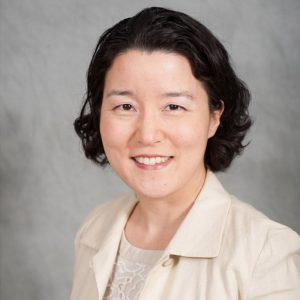
PhD Program Director, Professor
Contact Information
Email: hnoh1@sw.ua.edu
Research Areas and Expertise
- Palliative and Hospice Care
- Pain Management
- End-of-Life Care Decision Making and Communications
- Health Disparities
- Qualitative Methods
Education
- BA, MA, Seoul National University, Seoul, Korea
- MSSW, University of Wisconsin-Madison
- PhD, University of Wisconsin-Madison
Bio
Hyunjin Noh, Ph.D., MSW, is a Professor at the University of Alabama School of Social Work. She is a Deep South Resource Center for Minority Aging Research (RCMAR) Scholar and a Cambia Sojourns Scholar. Her research areas include end-of-life care decision-making, pain and symptom management in rural communities, deprescribing and non-pharmacological pain management among chronically ill older adults, palliative care education, and racial disparities in end-of-life care. She has methodological expertise in qualitative and mixed methods. As a researcher, she strives to take an interdisciplinary, community-based participatory research (CBPR) approach whenever possible and collaborates with multiple community-based organizations throughout Alabama, including the Area Agency on Aging, Black Belt Community Foundation, and local hospice agencies.
Funded by the Cambia Health Foundation, Dr. Noh’s current research project provides community-based education intervention to promote advance care planning among immigrants. Her past funded projects examined the attitudes toward deprescribing and knowledge and views of non-pharmacological pain management among community-dwelling older adults with multiple chronic health conditions (funded by US Deprescribing Network (R24AG064025, National Institute on Aging), transportation barriers in pain management among rural residents in Alabama (Alabama Transportation Institute), factors affecting the use of hospice and palliative care among adolescent and young adult cancer patients (Palliative Care Research Cooperative: U2CNR014637, National Institute of Nursing Research of the National Institutes of Health), and perceptions of advance care planning by race and health status (Deep South RCMAR Pilot Grant: National Institute on Aging). She also piloted an educational intervention program to improve palliative care knowledge among family caregivers of cognitively impaired older adults (Shiley Haynes Institute for Palliative Care Seed Grant: the Mary and Gary West Foundation).
Selected Publications
Noh, H.*, Halli-Tierney, A., Lee, L. H., & Suntai, Z. (2024). Association between level of pain and depression among chronically ill older adults in rural Alabama. Best Practices in Mental Health, 20(1), 17-31. https://doi.org/10.70256/508642swsdal
Bang, S., Noh, H., Handzo, G., Galchutt, P., & Kwak, J. (2024). Healthcare chaplains’ perspectives on working with culturally diverse patients and families. Palliative & Supportive Care, Advance online publication. https://doi.org/10.1017/S147895152400066X
Zhang, P., Nketsiah, E., & Noh, H.* (2024). Service providers’ perspectives on barriers to end-of-life care planning among rural family caregivers of older adults with cognitive impairment. Journal of Gerontological Social Work, 67(6), 825-840. https://www.tandfonline.com/doi/full/10.1080/01634372.2024.2351071
Noh, H.*, Suntai, Z., Won, C., Jeong, H., & Lee, L. H. (2024). A qualitative exploration of rural older adults’ experiences with pain from chronic illnesses and its treatment. Research on Aging, Advance online publication. https://doi.org/10.1177/01640275241246279
Noh, H.*, Lee. H. Y., Luo, Y., & Lee, L. H. (2022). Willingness to Discuss End-of-Life Care Wishes among Rural African Americans. The Journal of Applied Gerontology, 41 (7), 1763-1772, https://doi.org/10.1177/07334648221084174
Noh, H.*, Lee, H. Y., Lee, L. H., & Luo, Y. (2021). Awareness of Hospice Care among Rural African-Americans: Findings from Social Determinants of Health Framework. American Journal of Hospice and Palliative Medicine, 39 (7), 822-830, https://doi.org/10.1177/07334648221084174
Noh, H.*, Lee, L. H., & Won, C. (2021). Educational intervention to improve palliative care knowledge among informal caregivers of cognitively impaired older adults. Palliative & Supportive Care, 19(5), 515-523. doi:10.1017/s1478951520001200.
Google Scholar: https://scholar.google.com/citations?user=xJ0S874AAAAJ&hl=en
